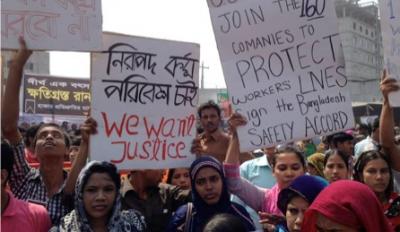
One of the reasons the Accord on Fire and Building Safety is such an important safety program in Bangladesh is that they understand that dangerous workplaces are not just failures in building engineering or fire and electrical safety, but also of failures of a social system that ignores and excludes workers and denies them their voice. Workers know the safety problems in their factories better than anyone else. When they are denied the opportunity to report on those problems and suggest solutions, their workplaces are not safe. That is why the Accord comes to the defense of workers who are courageous enough to voice their concerns about safety only to be fired or otherwise punished. So should the Bangladeshi government and the industry association, the Bangladesh Garment Manufacturers and Exporters Association (BGMEA).
In fact, Bangladesh's National Tripartite Plan of Action on Fire Safety and Structural Integrity in the Ready-Made Garment Sector does recognize that workers who are not free to organize and to give voice to their concerns about safety cannot be safe. This plan appropriately aims to improve industrial relations and remove obstacles to union formation, seeking to “improve protection in law and practice for the fundamental rights to freedom of association and collective bargaining.” The US Government’s “Bangladesh Action Plan” also calls for Bangladesh to take a series of steps to protect workers’ freedom of association in order to regain eligibility for trade benefits, withdrawn in the wake of the Rana Plaza building collapse. For example, it requires Bangladesh to ensure protection of unions and their members from anti-union discrimination, public reporting on anti-union discrimination and other unfair labor practice complaints, and a training program for industrial police to prevent harassment, intimidation, and violence against labor activists.
However, last week, after the Director of the Accord pressured a factory to reinstate union leaders who were fired for raising concerns about their safety, BGMEA President Atiqul Islam reportedly complained to the Bangladeshi Finance Minister that the Accord was a “big problem” for Bangladesh’s garment industry. “Factory owners have the legal right to appoint and suspend workers,” he said, according to local media.[i]
The BGMEA President’s complaint is part of a larger pattern of statements by high profile political and industry leaders in Bangladesh that raise questions about Bangladesh’s commitment to protect workers’ fundamental right to organize and form unions, and to protect their own safety.
In June 2014, Bangladeshi media reported that the Bangladeshi Commerce Minister and the President of BGMEA called for retaliatory action against labor leaders who reported on the violence against union organizers. The leader of the BGMEA demanded ”exemplary punishment” of the labor leaders for “harming the country’s image abroad.”[ii]
Prime Minister Hasina escalated the rhetoric of violence against labor leaders, speaking at the inauguration of the Dhaka Apparel Summit, December 7-9, 2014. She alluded to “local and foreign conspirators” against the Bangladeshi garment industry, calling for “factory owners, workers, foreign buyers and consumer to be aware of [them]."[iii] Several unions worried that the statements were targeted at them, and reported that labor ministry officials had told them that their union registrations would be rejected because of their connections to international organizations.
In March 2015, Bangladeshi press again warned against “local and foreign conspirators against the garment industry” referring to secret service reports about a “conspiracy” to “instigate activities” and “ignite the workers.” According to the articles, the intelligence branch had confirmed that “so called labor leaders” are acting as agents of foreign conspirators, naming Kalpona Akter, the Executive Director of the Bangladesh Center for Worker Solidarity, as one of these “conspirators.”[iv]
Such words from high-ranking government and business officials are eerily reminiscent of the Prime Minister referring to labor leaders as “enemies of the nation” after minimum wage protests in 2010.[v] Those leaders were persecuted, falsely charged with criminal activity, beaten and imprisoned. Only in 2014 did the government finally drop all charges against them.
Bangladesh should follow its own action plan to protect workers’ fundamental right to freedom of association and collective bargaining and take concerted action against union discrimination, as required in the US action plan. The rhetoric of violence against trade union leaders and others who seek to support workers’ right to organize is dangerous. It intimidates, silences, and marginalizes workers, and therefore makes the factories more dangerous still, contrary to the goals of the Bangladeshi government.
[iv] Original article: http://www.banglanews24.com/beta/fullnews/bn/375505.html

